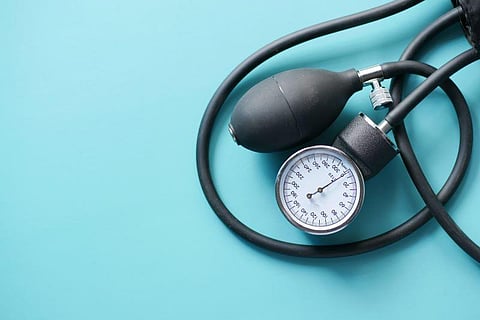MONDAY, Feb. 20, 2023 (HealthDay News) -- You're in your doctor's office, and the nurse checks your blood pressure as a matter of course. But this time, your numbers are high. The nurse checks your blood pressure again later on in your visit, and tells you to come back on a different day for a recheck. You get the same results each time—and they’re pointing toward high blood pressure.
So, now that you have high blood pressure, what is it and what can you do about it?
The American Heart Association (AHA) describes blood pressure as the measure of the force pumping blood through the arteries, which carry blood from the heart throughout the body.
Measured by two numbers, the top number (the systolic pressure) is the force of the blood when your heart pumps, and the bottom number (diastolic pressure) is when your heart is resting and filling with blood.
Normal blood pressure can vary from individual to individual, and it can rise and fall throughout the day, said Dr. Michael Blaha, a Johns Hopkins cardiologist. He recommends regularly measuring blood pressure at home and keeping track of trends. Generally, blood pressure is considered healthy when it is 120/80 or less.
“As a physician, I’m much more interested in what a patient’s blood pressure looks like at home, under their normal conditions, than what it looks like at a single point in time in my office,” Blaha said. “Knowing your blood pressure over time best helps your doctor identify whether you have a problem.”
What is high blood pressure?
High blood pressure, or hypertension, is when the force of blood flow remains consistently elevated.
The AHA considers high blood pressure to be any reading that is 130/80 or higher. If your blood pressure reaches 180/120 or higher, you are in a hypertensive crisis and you should call your doctor immediately.
Prolonged and uncontrolled blood pressure can damage blood vessels leading to complications like heart disease, stroke, kidney failure and problems with vision.
What causes high blood pressure?
Many things can cause high blood pressure. Chronic hypertension usually develops over time due to poor diet, lack of regular exercise, smoking, too much alcohol, obesity and uncontrolled diabetes, according to the AHA.
Stress and anxiety also play a role in elevating blood pressure.
In certain cases, hypertension can happen during pregnancy, causing life-threatening conditions: preeclampsia, eclampsia and stroke. Dr. Sara Hallum of the University of Copenhagen said this can increase women's risk of early-onset heart disease.
Symptoms of high blood pressure
Nearly half of the adult American population has high blood pressure and is unaware that damage is being done, according to the AHA.
Although the risk for high blood pressure increases with age, Dr. Rita Melkonian told HealthDay News that it can also occur at younger ages in women. There are usually no signs or symptoms, hence its nickname of “the silent killer.” Melkonian said the best way to determine blood pressure status is to have it checked by a health care professional.
High blood pressure medications
There are many ways to lower high blood pressure. Johns Hopkins lists lifestyle changes as the first line of defense.
Adding physical activity — at least 30 minutes, five days per week — is recommended
Incorporating the DASH diet, a high blood pressure diet that lowers salt while increasing consumption of fresh fruits, vegetables and whole grains
Quitting smoking
Limiting or avoiding alcohol
Losing weight
Medications may be added if lifestyle changes are not enough to maintain healthy blood pressure. According to the U.S. Centers for Disease Control and Prevention, high blood pressure medications help by:
Regulating fluid balance and salt levels
Relaxing blood vessels that may have stiffened with age
Causing the heart to beat with less force
Controlling the nerves that restrict the blood vessels
One or a combination of these medications may be needed to get blood pressure under control. In general, blood pressure medications are low-risk but can cause some symptoms such as dizziness, headaches and swelling. Medications may need to be adjusted to minimize side effects and risks, the CDC added.
How to lower high blood pressure
The lifestyle changes that can help treat high blood pressure can also help prevent it from becoming elevated if started early. The CDC lists them as exercise, a high-fiber diet low in fat and salt, no smoking, limited alcohol and maintaining a healthy weight. These will all go a long way in preventing high blood pressure.



